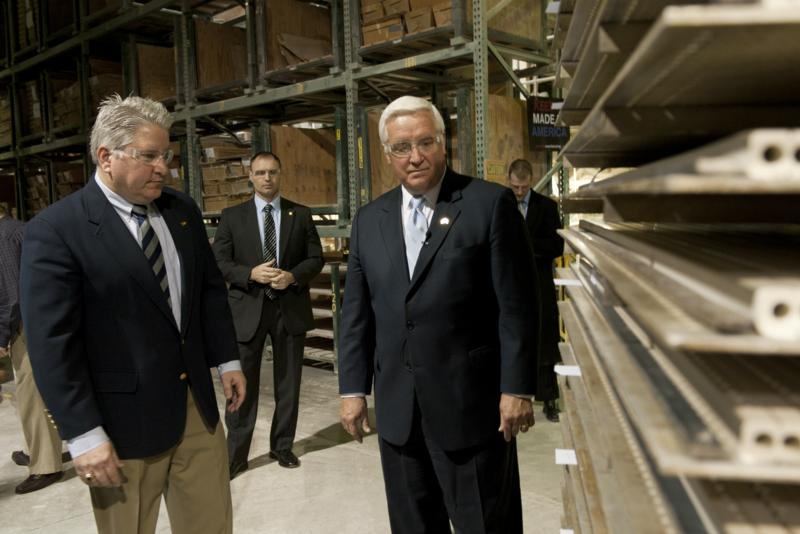Posts
Automakers Respond to Natural Gas Boom
/in News /by PAMattersPennsylvania was among the first states to sign a memorandum of understanding, which indicates their intent to start converting fleet vehicles to natural gas. Only a matter of months after the agreement was first announced, Chrysler and GM are unveiling plans to produce natural gas-powered pickup trucks. “We are going to try to convert our fleets – light duty trucks – over to natural gas, to give Detroit some impetus to do this,” Governor Tom Corbett said on Radio PA’s Ask the Governor program. “I can’t say directly that’s what Chrysler looked at, but I think it certainly had an influence.”
Corbett believes the natural gas boom is changing everything, and as a result the natural gas infrastructure will develop fairly quickly.
House Republican Whip Stan Saylor (R-York) is adding legislative muscle to the conversation by introducing a bill that would incent companies to convert their commercial fleets to natural gas. “By incentivizing these vehicles we will use natural gas, which will spur construction of the statewide refueling network that is needed to create and spread the use of natural gas vehicles here in Pennsylvania,” Saylor said at a capitol news conference.
The network of refueling stations would then make it practical for consumers to drive natural gas cars. Saylor believes it would both lower transportation costs and further expand Pennsylvania’s natural gas industry.
Saylor’s bill would tap the state’s Clean Air Fund for $6-million dollars a year, over the next five years, to provide grants that help cover the costs of converting large trucks to natural gas. “This is a perfect example of why that fund was created,” Saylor says, noting that natural gas vehicles reduce carbon emissions by 90%.
Saylor says the natural gas equivalent of a gallon of gas only costs about $2-dollars, compared to gasoline prices which are approaching the $4-dollar mark.
Governor Corbett Heads Overseas This Month
/in News /by PAMattersAs Pennsylvania’s St. Patrick’s Day festivities begin winding down, Governor Tom Corbett’s international trade mission will be ramping up. Corbett is leading a trade mission to France and Germany, two of the state’s most important trade partners.
“The goals are to establish a stronger tie with our trading partners that we already have that do business here in Pennsylvania from France and Germany, but also to look for more people to come over and do business here in Pennsylvania.” Corbett said on Radio PA’s Ask the Governor program.
Combined, French and German companies already employ 53,400 people in the Keystone State. Corbett thinks they can entice more foreign companies to invest in Pennsylvania based on its cheap power supplies and strong workforce. “We’re making ourselves much more business friendly than we were before,” he adds.
Site Selection magazine has ranked Pennsylvania third in the nation with 453 new or expanded corporate facilities in 2011, according to a recent news release from the governor’s office. That’s an increase of more than 100 projects from 2010.
Corbett will be joined on the trade mission by a delegation of Pennsylvania business leaders. The mission is being privately funded and organized by the Team Pennsylvania Foundation.
Governor Tom Corbett on property tax reductions through casino revenues
/in Ask the Governor, Media, News, Video /by PAMattersGovernor Tom Corbett on funding for transportation
/in Ask the Governor, Media, News, Video /by PAMattersGovernot Tom Corbett on funding for higher education
/in Ask the Governor, Media, News, Video /by PAMattersMissed Opportunities on Marcellus Shale?
/in News /by PAMattersSeverance tax advocates say legislative inaction is adding up to millions of dollars in lost revenue. In fact, the Pennsylvania Budget & Policy Center’s “Drilling Tax Ticker” crossed the $300-million dollar mark late last month. That’s money that Research Director Mike Wood says could be put to good use. “We’ve been making lots of cuts to teachers in our schools, domestic violence shelters have had to close their doors to new people. This is definitely something that could have helped in a time when revenue is pretty hard to come by.”
The ticker is based on an effective tax rate of roughly 6%, whereas the impact fee proposal being hammered out by GOP negotiators in Harrisburg would more likely be in the one or two percent range. “Most states that have either oil or gas have a severance tax. The major producing states all have such a tax,” Wood tells Radio PA. “Pennsylvania is the only one that doesn’t.”

A Revenue Department analysis, last year, found that natural gas companies had paid more than a billion dollars in taxes since 2006. However, Mike Wood questions that figure because it includes taxes not directly related to drilling activity.
Governor Tom Corbett isn’t fazed when critics point out that Pennsylvania is the largest gas-producing state without a severance tax. He uses the Texas analogy. “They pay a severance tax in Texas, yes they do, but their corporate income tax is considerably lower. So we have to compare apples to apples, not apples to pears.”
While Pennsylvania may not have a severance tax, the governor says they are paying corporate and related taxes. “They’ve paid billions of dollars in taxes, so far, in Pennsylvania directly,” Corbett said on a recent edition of Ask the Governor. “But keep in mind all of their employees, all the companies they purchase goods and services from, they’re all paying taxes also.”
Both Corbett and Senate President Pro Tem Joe Scarnati (R-Jefferson) have expressed a desire to finalize impact fee discussions before next week’s budget address.
Whistle-blower Website Focuses on Appalachian Region
/1 Comment/in News /by PAMattersInspired by Wikileaks, a group of freelance journalists and computer scientists has developed a website known as Honest Appalachia. “We hope to allow whistle-blowers to anonymously and securely upload documents to our site, which we will then vet for authenticity,” says co-founder Jim Tobias.
It’s risky being a whistle-blower, according to Tobias. “So we felt that this resource would take that risk and replace it with a secure website that will enable whistle-blowers to more confidently blow the whistle on what they see as corruption.”
The launch of Honest Appalachia prompted discussion on the most recent edition of Ask the Governor. For his part, Governor Tom Corbett says he doesn’t trust anonymous sources. “You can say anything you want when you’re anonymous. If you say something, stand behind it.”
Tobias disagrees. He says anonymous whistle-blowing can be critically important to democracy. “Arguably the most important, crucial case of whistle-blowing in US history was done by an anonymous source, which was when Deep Throat leaked information to Bob Woodward and Carl Bernstein that enabled them to uncover the Watergate scandal.”
Per its name, Honest Appalachia covers a seven state region that includes Pennsylvania. Tobias says they’re already following a few leads, but are moving slowly because of their commitment to journalistic integrity. “We really don’t want to put anything out there that isn’t true.”
Governor Tom Corbett answers listener email 2
/in Ask the Governor, Media, News, Video /by PAMattersWelcome to PAMatters.com, a new source for news and commentary from Pennsylvania’s capital. In addition to video, audio and pictures from the stories and events that affect YOU, you’ll also get some behind-the-scenes analysis via blogs from our award-winning staff of journalists.






